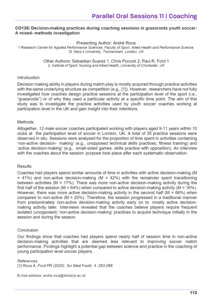Roca, A., Aguilera-Suarez, S., Pocock, C. and Ford, P., R. (2022) Decision-making practices during coaching sessions in grassroots youth soccer: A mixed-methods investigation. In: World Conference on Science and Soccer, 15th-17th June 2022, Coimbra, Portugal.
![[thumbnail of Roca, A., et al, Decision-making practices during coaching sessions in grassroots youth soccer: A mixed-methods investigation, World Conference on Science and Soccer, Portugal]](https://eprints.chi.ac.uk/7354/1.hassmallThumbnailVersion/Roca%20et%20al.%20%282022%29.png)

Roca et al. (2022).png - Accepted Version
Available under License Creative Commons Attribution 4.0.
Download (438kB) | Preview
Abstract
Decision making ability in players during match-play is mostly acquired through practice activities with the same underlying structure as competition (e.g., [1]). However, researchers have not fully investigated how coaches design practice sessions at the participation level of the sport (i.e., “grassroots”) or of why they used a particular activity at a specific time point. The aim of this study was to investigate the practice activities used by youth soccer coaches working at participation level in the UK and gain insight into their intentions. Methods Altogether, 12 male soccer coaches participated working with players aged 9-11 years within 10 clubs at the participation level of soccer in London, UK. A total of 35 practice sessions were observed in situ. Sessions were analysed for the proportion of time spent in activities containing ‘non-active decision-making’ (e.g., unopposed technical skills practices, fitness training) and ‘active decision-making’ (e.g., small-sided games, skills practice with opposition). An interview with the coaches about the session purpose took place after each systematic observation. Results Coaches had players spend similar amounts of time in activities with active decision-making (M = 41%) and non-active decision-making (M = 42%) with the remainder spent transitioning between activities (M = 17%). There was more non-active decision-making activity during the first half of the session (M = 64%) when compared to active decision-making activity (M = 16%). However, there was more active decision-making activity in the second half (M = 66%) when compared to non-active (M = 20%). Therefore, the session progressed in a traditional manner from predominately non-active decision-making activity early on to mostly active decision-making activity later. Interviews revealed that the coaches believe players require frequent isolated (unopposed) ‘non-active decision-making’ practices to acquire technique initially in the session and during the season. Conclusion Our findings show that coaches had players spend nearly half of session time in non-active decision-making activities that are deemed less relevant to improving soccer match performance. Findings highlight a potential gap between science and practice in the coaching of young participation level soccer players. References [1] Roca A, Ford PR (2020). Sci Med Footb. 4, 263-268.
| Publication Type: | Conference or Workshop Items (Paper) |
|---|---|
| Uncontrolled Keywords: | football, soccer, match-play, practice sessions, science |
| Subjects: | G Geography. Anthropology. Recreation > GV Recreation Leisure > GV201 Physical education and training G Geography. Anthropology. Recreation > GV Recreation Leisure > GV557 Sports G Geography. Anthropology. Recreation > GV Recreation Leisure > GV557 Sports > GV711 Coaching |
| Divisions: | Academic Areas > Institute of Sport Academic Areas > Institute of Sport > Research Theme > Enhancing Sport Performance Research Entities > Centre for Health and Allied Sport and Exercise Science Research (CHASER) |
| Event Title: | World Conference on Science and Soccer |
| Event Location: | Coimbra, Portugal |
| Event Dates: | 15th-17th June 2022 |
| Related URLs: | |
| Depositing User: | Chris Pocock |
| Date Deposited: | 13 Feb 2024 15:36 |
| Last Modified: | 10 Jun 2024 10:37 |
| URI: | https://eprints.chi.ac.uk/id/eprint/7354 |
 Lists
Lists Lists
Lists
